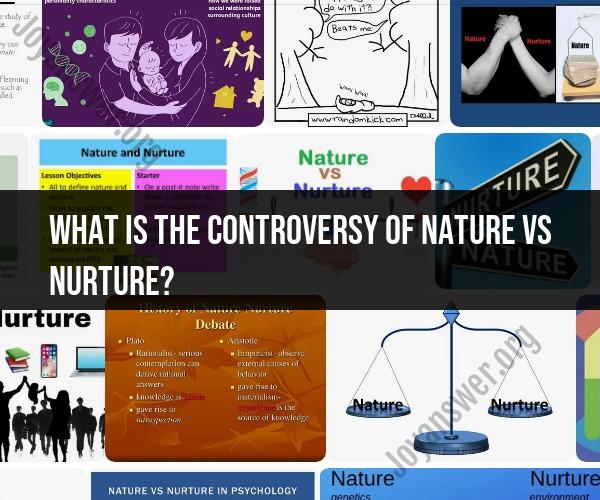What is the controversy of nature vs nurture?
The "nature vs. nurture" controversy is a long-standing debate in the fields of psychology, biology, and philosophy that centers around the relative influence of genetics (nature) and the environment (nurture) on various aspects of human development, including behavior, personality, intelligence, and other traits. This debate asks whether our inherent qualities, such as genetic factors, are more significant in shaping who we are, or if the environment, upbringing, and life experiences have a greater impact.
Key points in the nature vs. nurture controversy:
Nature (Heredity):
- The "nature" side of the debate argues that genetic and biological factors primarily determine human traits. This perspective suggests that many aspects of an individual's personality, intelligence, and physical characteristics are predetermined by their genetic makeup.
- Proponents of the nature viewpoint often emphasize the role of genetics, citing studies of twins and family genetics as evidence for the hereditary basis of certain traits.
Nurture (Environment):
- The "nurture" side argues that environmental factors, including upbringing, social interactions, education, and culture, play a more significant role in shaping human development. This perspective suggests that individuals are products of their environments, and their traits are shaped by their experiences.
- Advocates for the nurture perspective highlight the importance of learning, socialization, and experiences in molding a person's behavior, values, and abilities.
Interactionist Perspective:
- Many modern scholars and researchers take an interactionist approach, suggesting that both nature and nurture interact and influence each other. They emphasize that it's not a matter of one versus the other but rather the complex interplay between genetic predispositions and environmental influences.
Implications:
- The nature vs. nurture debate has implications for various fields, including psychology, education, genetics, and the understanding of human behavior. It influences discussions about topics such as intelligence, criminal behavior, mental health, and the role of genetics in various traits.
Current Scientific Understanding:
- Contemporary research in fields like behavioral genetics and neuroscience shows that both genetic and environmental factors play a role in human development. For example, studies have demonstrated that traits like intelligence, personality, and mental health are influenced by a combination of genetic predisposition and environmental experiences.
Ethical Considerations:
- The nature vs. nurture debate has ethical implications in areas like genetic testing, eugenics, and the responsibility of individuals and societies in providing equal opportunities for people with diverse genetic and environmental backgrounds.
In summary, the nature vs. nurture controversy remains a central topic of discussion and research. While the debate has evolved over time, the consensus in contemporary science is that both genetic factors (nature) and environmental influences (nurture) interact and jointly contribute to the development of human traits and behaviors.
The Nature vs. Nurture Controversy: Understanding the Debate
The nature vs. nurture controversy is a long-standing debate about the relative importance of genetics and environment in shaping human development. Nature refers to the inherited traits that we pass down from our parents, while nurture refers to the environmental factors that influence our development, such as our upbringing, education, and social experiences.
The debate over nature vs. nurture is complex and nuanced, and there is no easy answer. Both genetics and environment play a role in shaping who we are, and the relative importance of each factor can vary depending on the trait in question.
Nature vs. Nurture: Key Points in the Age-Old Debate
Here are some key points in the age-old debate over nature vs. nurture:
- Genetics: Genes play a role in a wide range of human traits, including physical appearance, intelligence, personality, and susceptibility to disease.
- Environment: Environmental factors, such as upbringing, education, and social experiences, also play a significant role in shaping human development.
- Interaction: Nature and nurture interact in complex ways to influence human development. For example, a child with a genetic predisposition to intelligence will still need a stimulating environment in order to reach their full potential.
The Role of Genetics and Environment in Human Development
Genetics and environment both play important roles in human development. Genes provide the basic blueprint for who we are, but environment determines how those genes are expressed.
For example, a child with a genetic predisposition to intelligence will still need a stimulating environment in order to reach their full potential. A child who is raised in a neglectful or abusive home may have difficulty developing their cognitive abilities, even if they have the genetic potential to be intelligent.
Debunking Myths and Misconceptions in the Nature vs. Nurture Argument
There are a number of myths and misconceptions surrounding the nature vs. nurture debate. Here are a few of the most common ones:
- Myth: Nature is more important than nurture.
- Fact: Nature and nurture interact in complex ways to influence human development. Both factors play important roles in shaping who we are.
- Myth: Intelligence is determined by genetics.
- Fact: Intelligence is a complex trait that is influenced by both genes and environment. Children who are raised in stimulating environments are more likely to reach their full cognitive potential, even if they do not have a genetic predisposition to intelligence.
- Myth: Personality is determined by genetics.
- Fact: Personality is a complex trait that is influenced by both genes and environment. Children who are raised in nurturing and supportive environments are more likely to develop positive personality traits, such as empathy and resilience.
Reconciling Nature and Nurture for a Holistic Perspective
The nature vs. nurture debate is often framed as a dichotomy, but it is important to remember that these two factors are not mutually exclusive. Nature and nurture interact in complex ways to shape human development. Both factors play important roles in shaping who we are.
To better understand human development, we need to take a holistic perspective that considers both nature and nurture. We need to understand how genes and environment interact to shape our physical appearance, intelligence, personality, and susceptibility to disease.
By understanding the role of both nature and nurture in human development, we can create a better world for all children. We can ensure that all children have the opportunity to reach their full potential, regardless of their genetic makeup.












